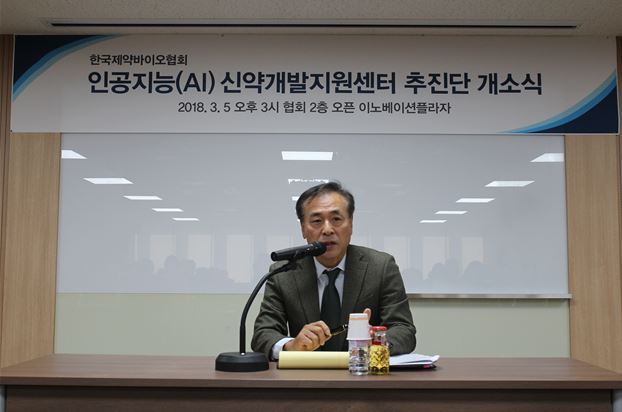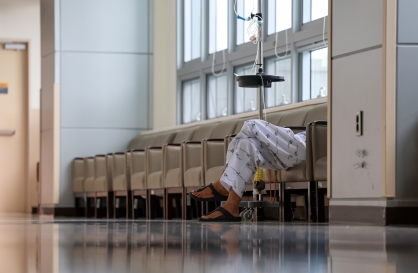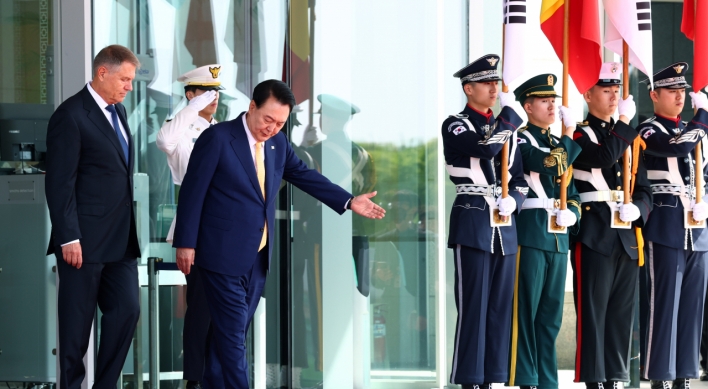Korean biopharma association to support AI-based drug development
By Sohn Ji-youngPublished : March 5, 2018 - 19:14
South Korea’s largest biopharmaceutical business association has kickstarted preparations for a support center that will leverage artificial intelligence to help Korean pharmaceutical companies accelerate new drug development processes.
The move comes as Korea seeks to catch up with big pharma firms in the US and Europe which have begun to pour investments into AI for drug discovery. Uses for AI in developing medicines include identifying promising drug candidates and determining the right biomarkers for clinical trials.
The Korea Pharmaceutical and Bio-Pharma Manufacturers Association on Monday initiated a new task force to oversee preparations for this new center, which is slated to open in 2019.
The move comes as Korea seeks to catch up with big pharma firms in the US and Europe which have begun to pour investments into AI for drug discovery. Uses for AI in developing medicines include identifying promising drug candidates and determining the right biomarkers for clinical trials.
The Korea Pharmaceutical and Bio-Pharma Manufacturers Association on Monday initiated a new task force to oversee preparations for this new center, which is slated to open in 2019.

The task force includes the KPBMA, the state-led Korea Health Industry Development Institute, the Korea Conformity Laboratories, AI technology firms, industry advisors as well as 17 local pharmaceutical companies including Hanmi Pharmaceutical, Green Cross, Boryung Pharmaceutical, Daewoong Pharmaceutical, Crystal Genomics, Dong-A ST, LG Chem and Handok Pharmaceuticals.
The upcoming center is slated to act as a neutral, overarching body that will build an AI-based drug development platform best suited for use by Korean drugmakers.
Through the center, the KPBMA said it would help local drug developers compete with global pharma companies which have been readily embracing AI to make their drug development process faster and less costly.
“Though AI has already been applied to various areas, its application to the pharma sector has been relatively recent,” said Lee Dong-ho, vice chairman of the Organizational Task Force for AI-based New Drug Development Platform.
“As every new business is a global marathon (for leadership), I believed that (AI-based drug development) was an area where Korea has a good chance (of success).” he said.
This year, the task force will focus on figuring out the direction of the new center, such as by learning from existing AI systems like IBM’s Watson being used to aid drug discovery, to determine the pros and cons of algorithms for use by Korean firms.
It also aims to steer ongoing efforts to standardize biomedical data -- those available on the public domain as well as those stored by the government -- into a format that can be used to train AI systems.
It will particularly focus on determining how a particular medical dataset will be used in training an AI, prior to undergoing standardization, to ensure that resources are not wasted, Lee noted.
According to the chairman, the KPBMA’s upcoming center would be in the best position to achieve such goals as it represents the end users of AI drug development platforms, while also remaining impartial as a neutral entity.
He also stressed that AI-backed drug development is a new field still under exploration and without clear conclusions or leaders, suggesting room for Korea to play catch-up.
“What I’ve felt after speaking with companies exploring this field is that there is still some doubts about AI’s use in new drug development. At the end of the day, even global big pharma firms which have worked with AI for drug discovery are still asking themselves, ‘So what?’” Lee said.
By Sohn Ji-young (jys@heraldcorp.com)


![[AtoZ into Korean mind] Humor in Korea: Navigating the line between what's funny and not](http://res.heraldm.com/phpwas/restmb_idxmake.php?idx=644&simg=/content/image/2024/04/22/20240422050642_0.jpg&u=)




![[Herald Interview] Why Toss invited hackers to penetrate its system](http://res.heraldm.com/phpwas/restmb_idxmake.php?idx=644&simg=/content/image/2024/04/22/20240422050569_0.jpg&u=20240422150649)

![[Graphic News] 77% of young Koreans still financially dependent](http://res.heraldm.com/phpwas/restmb_idxmake.php?idx=644&simg=/content/image/2024/04/22/20240422050762_0.gif&u=)




![[Exclusive] Korean military set to ban iPhones over 'security' concerns](http://res.heraldm.com/phpwas/restmb_idxmake.php?idx=652&simg=/content/image/2024/04/23/20240423050599_0.jpg&u=)



